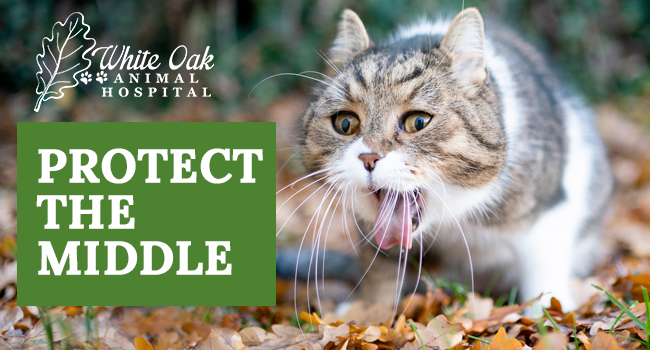
Cat diarrhea and vomiting can be alarming for pet owners.
If your pet vomits more than three times, cannot keep food down, and seems tired, consult your veterinarian immediately.
However, if your cat suffers from chronic diarrhea and vomiting, you can work with your vet to come up with a gentle solution for aiding their digestion.
What is Chronic Cat Diarrhea and Vomiting?
Chronic Diarrhea in Cats
Firstly, chronic cat diarrhea is when your cat:
- Suffers loose stools for a period of three weeks straight.
- Experiences recurring bouts of diarrhea over long periods of time.
There are many causes of chronic diarrhea in cats.
For example, some of the most common include:
- Dietary changes
- Dietary sensitivity
- Intestinal structural abnormalities
- Intestinal parasites
- Irritable bowel disorder
- Toxins
Most importantly, you should get help from your veterinarian for chronic feline diarrhea.
Next, your vet will rule out other diseases and health problems starting with a symptom-based history.
Then, they will figure out if the problem originates in the small or large intestine.
Additionally, other tests might include:
- Fecal examination
- Urinalysis
- Thyroid function tests
- X-rays
Lastly, if answers are still not obtained, most vets recommend an endoscopy, colonoscopy, biopsy, or ultrasound.
Chronic Vomiting in Cats
Firstly, vomiting a few times per month is sometimes considered common in cats.
However, cats that vomit hairballs frequently may be experiencing a gastrointestinal disease.
Secondly, if your cat chronically vomits, you should see a veterinarian. However, if your cat continues to eat, keeps food down, and seems comfortable, a vet visit may not be urgent.
Natural Solutions for Cat Diarrhea and Vomiting
Treatments vary depending on exactly what is going on with your cat.
For example, your cat might need surgery for an intestinal mass or obstruction.
Or, if your cat is dehydrated, most vets recommend fluid therapy to rehydrate.
Once a vet has ruled out serious health problems, they may recommend an herbal supplement to help support your pet’s digestion. For example, Kan Essentials Protect The Middle contains a blend of herbs specifically chosen to help with cat diarrhea and vomiting.
Poria
Poria helps maintain healthy bowel function in cats with diarrhea.
Patchouli Herb
Many practitioners recommend patchouli for nausea, vomiting, diarrhea, and stomach pain.
Tangerine Dried Rind of Mature Fruit
Firstly, tangerine is often used to dry up mucus in the stomach.
Secondly, tangerine may help regulate and strengthen digestion, treating diarrhea and nausea.
Thirdly, Chinese pharmacological studies suggest tangerine relaxes the smooth muscles in the gastrointestinal tract.
Magnolia Bark
Magnolia Bark has been used to treat nausea and morning sickness for hundreds of years.
White Atractylodes Rhizome
Firstly, atractylodes contain chemicals that may improve the function of the digestive tract.
Secondly, they may reduce pain and inflammation.
Ginger Cured Pinellia Rhizome
Firstly study results showed ginger with pinellia pacifies the stomach and stops vomiting.
Chinese Rhubarb Rhizome and Root
Practitioners commonly recommend rhubarb for diarrhea, stomach pain, and indigestion.
Chinese Licorice Root and Rhizome
In one study, licorice root capsules were shown to significantly improve symptoms of indigestion.
Ginger Rhizome
Studies show the efficacy of ginger for the prevention of nausea and vomiting.
Red Jujube Fruit
Red jujube fruit may help with digestion and constipation.
Platycodon Root
Veterinarians recommend platycodon root for its anti-inflammatory qualities.
Perilla Leaf
In one study, perilla extract improved gastrointestinal discomfort.
Seeking an all natural remedy for cat diarrhea and vomiting? Try Kan Essentials Protect The Middle.